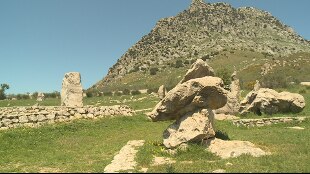May 1st, commemoration of the Portella della Ginestra massacre without the procession prevented by the coronavirus
2020-05-01T18:08:26.030Z

"From the memory of the workers' struggles and the deaths of those years, we must draw out the energy to fight the pandemic that borders us at home and to build a work society". This was stated by the general secretary of the CGIL Palermo, Enzo Campo, who went to Portella della Ginestra this morning to pay homage to the victims of the massacre of May 1, 1947. No procession, for this May Day, from Piana degli Albanesi to the Portella memorial , as always for 72 years now. Two restricted ceremonies only: first the deposition of a wreath at the cemetery, then the flowers placed on the stone of Barbato, next to the names of the martyrs of Portella. In addition to Cgil secretary Enzo Campo, Serafino Petta, 89 years old, survivor of the massacre and honorary president of the Portella della Ginestra association, who with great emotion read the names of the 14 victims, Papas Jani Pecoraro and the mayor of Piana degli Albanesi , Rosario Petta. "We are saddened, because today the First of May in Portella is not crowded with the many union leaders and militants and the people who spontaneously poured into this place every year. Our thoughts go to the thousands of people who would have liked to be here and who didn't I am but the CGIL has deemed it essential to help stop the spread of the coronavirus - said Enzo Campo - This festival takes on a particular value this year and leads us to an important reflection. We must draw from this memory the fundamental energy that must allow today to fight this epidemic that keeps us confined inside the house ". Even the President of the Sicilian Region, Nello Musumeci, went this morning to Portella della Ginestra to pay homage to the victims of the massacre of May 1, 1947. Alone, without cameras in tow, the governor stopped for a few minutes in recollection in front of the stele reminiscent of the massacre carried out by the Giuliano gang, under the orders of the mafia. "A still obscure page in our history - the president of the Region then commented - that in the difficult post-war period saw political banditry and mafia allies, without excluding some complicity of the state. Towards the blood of those innocent victims the whole Sicilian community must still feel today in debt. "
Share
May 01, 2020 "From the memory of the workers' struggles and the deaths of those years, we must draw out the energy to fight the pandemic that borders us at home and to build a work society". This was stated by the general secretary of the CGIL Palermo, Enzo Campo, who went to Portella della Ginestra this morning to pay homage to the victims of the massacre of May 1, 1947. No procession, for this May Day, from Piana degli Albanesi to the Portella memorial , as always for 72 years now. Two restricted ceremonies only: first the deposition of a wreath at the cemetery, then the flowers placed on the stone of Barbato, next to the names of the martyrs of Portella. In addition to Cgil secretary Enzo Campo, Serafino Petta, 89 years old, survivor of the massacre and honorary president of the Portella della Ginestra association, who with great emotion read the names of the 14 victims, Papas Jani Pecoraro and the mayor of Piana degli Albanesi , Rosario Petta. "We are saddened, because today the First of May in Portella is not crowded with the many union leaders and militants and the people who spontaneously poured into this place every year. Our thoughts go to the thousands of people who would have liked to be here and who didn't I am but the CGIL has deemed it essential to help stop the spread of the coronavirus - said Enzo Campo - This festival takes on a particular value this year and leads us to an important reflection. We must draw from this memory the fundamental energy that must allow today to fight this epidemic that keeps us confined inside the house ". Even the President of the Sicilian Region, Nello Musumeci, went this morning to Portella della Ginestra to pay homage to the victims of the massacre of May 1, 1947. Alone, without cameras in tow, the governor stopped for a few minutes in recollection in front of the stele reminiscent of the massacre carried out by the Giuliano gang, under the orders of the mafia. "A still obscure page in our history - the president of the Region then commented - that in the difficult post-war period saw political banditry and mafia allies, without excluding some complicity of the state. Towards the blood of those innocent victims the whole Sicilian community must still feel today in debt. "

